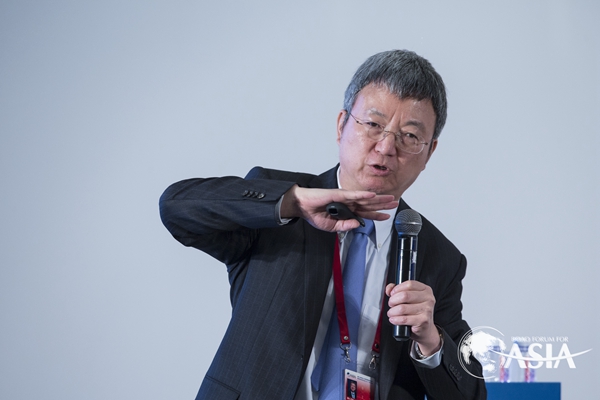External uncertainties pose major threat to Asia's economy
- By Guo Yiming
 0 Comment(s)
0 Comment(s) Print
Print E-mail China.org.cn, March 25, 2017
E-mail China.org.cn, March 25, 2017
 |
|
Zhu Min, former vice president of the International Monetary Fund [Photo provided to China.org.cn] |
Asia's economy is on course for steady growth while facing strong headwinds from global uncertainties, a top economist has warned.
The fundamentals for the region's economic growth are back on a sound footing and progressing on a steady track after a series of ups and downs, said Zhu Min, former vice president of the International Monetary Fund (IMF), noting the region has consistently contributed around 50 percent of global economic growth since 2008.
Zhu made the statement during the ongoing Boao Forum for Asia (BFA) on March 24.
Asia overall posted 5.3 percent GDP growth in 2016, roughly in line with the previous year, while certain emerging markets reached 6.3 percent, amid lackluster global economy and heightened external uncertainties, he said.
Faced with a trade downturn, some traditionally export-oriented Asian economies have been grappling with an expectedly-bumpy transition toward a more consumption-oriented structure, explained Zhu who viewed structural adjustment as an important feature in recent years.
Recognizing potential volatility in the financial markets,with rising debt levels and larger insolvency risks, Zhu believed external uncertainties remained the major threats to Asia's economic outlook.
U.S. President Donald Trump's hybrid policies, represented by a tightened monetary policy, relaxed fiscal policy, trade protectionism and overall lower growth targets, could be major challenges to the global economy with spillover effects on Asia's regional growth, the economist said.
This year might prove to be a massive turning point for the world economy and politics, as is shown in recent and expected rate hikes, the rise of populism, and worsening political cohesion, partly due to the skewed income distribution in many countries.
These are some of the external factors that could cast a shadow for the regional economy, he argued.
Meanwhile, Lin Guijun, vice president of University of International Business and Economics, said that, faced with heightened uncertainties, Asian economies should enhance a sense of community and work closer together to move out of the current economic trough.
Asia's integration in trade, production and finance were all suffering setbacks and macroeconomic policy coordination in the region was also weakening, according to an annual report issued on the Forum's opening day on March 23.
Another speaker, Carlos Gutierrez, former U.S.secretary of commerce, said that, in view of the problems facing the European Union following the Brexit vote and readjustment of the terms of NAFTA under the Trump administration, Asia should grab the opportunity and learn from others' mistakes, seeking to leapfrog over the hurdles they had faced or were facing.
The trade veteran believed Asia's integration process under the RCEP (Regional Comprehensive Economic Partnership) or ASEAN+6was set to create the world's biggest regional trading bloc.






Go to Forum >>0 Comment(s)